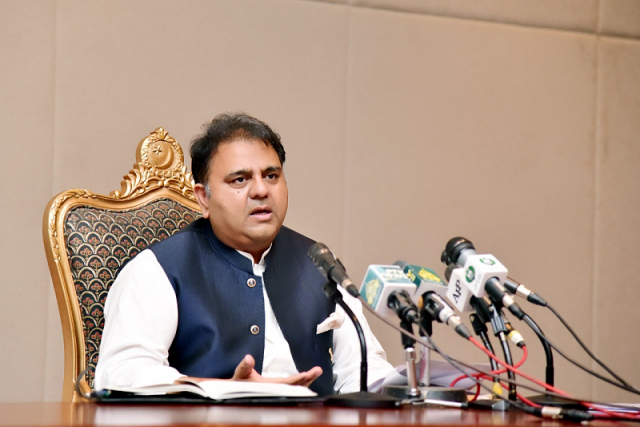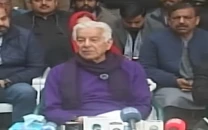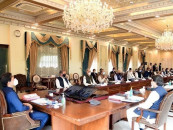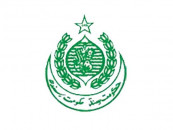Cabinet approves National Cyber Security Policy
Fawad says govt to launch comprehensive probe into phone hacking scandal

The federal cabinet on Tuesday approved the first ever National Cyber Security Policy, as the government prepared to launch a comprehensive investigation into the Pegasus spying scandal, Federal Minister for Information and Broadcasting Fawad Chaudhry said.
Sharing details of the decisions at a post-meeting news conference, Chaudhry said that a list of cyber security experts was being prepared, who would conduct a thorough probe, especially India’s use of Israeli spyware to hack the phone of Prime Minister Imran Khan.
“We want to conduct a comprehensive investigation so that we may share our investigation with the United Nations,” Chaudhry said. “We believe that this attempt to spy on Pakistan authorities is a criminal offence; an international criminal offence,” he said
He added that Pakistan would share the report with the relevant quarters as well. “We believe and we hope that the United Nations will take action on that,” the information minister told reporters.
Elaborating on the National Cyber Security Policy, the minister said that it would have two parts — cyber security and cyber offences. He added that cabinet also approved the advertisements policy for digital media, saying the government would now sanction advertisements to the digital media.
In addition, Chaudhry said, the ministers also approved spectrum auction for next generation mobile services.
Separately, he added, the Board of Investments was directed to propose legislation to help eradicate outdated laws and take substantive measures for ease of doing business in the country.
Charing the cabinet meeting, the prime minister said that there should be consensus between the government and the opposition on at least on key issues of national importance, emphasising that holding of “transparent elections” was one of them, Chaudhry said.
“Things are going well with the opposition at the parliamentary committee stage,” the government spokesperson said, adding that other controversial issues, including the National Accountability Bureau (NAB) law and the electoral reforms, could also be discussed.
“We want to have a detailed discussion with the opposition; we are serious about these things and want to take things forward,” the information minister said.
“The government and the opposition should agree to some minimum things [points] between them,” Chaudhry said.
“If the opposition thinks that the current system should be corrected then it should give its suggestions the way the government has tabled 49 points regarding electoral reforms.”
“Ours are not the scripture; you [opposition] may bring your suggestion wherever you feel our suggestions are wrong,” he said.
Meanwhile, the minister blamed former chief justice Iftikhar Muhammad Chaudhry for causing huge financial loss to the country in the Reko Diq case.
He said that such matters went to the international courts, which not only pushed the investments away but bilateral relations were also affected.
“The former chief justice Iftikhar Chaudhry had a major role in that case [Reko Diq] which caused great trouble to Pakistan and it had to pay a lot of money,” he said.
Adding that the government wished to bring a system where one man should not be able to take advantage and the country should not later face legal consequences of the decisions made by a single man.
On the coronavirus pandemic, Chaudhry emphasised that vaccination target should be achieved at the earliest. He said that the cabinet decided that the state-owned enterprises should start vaccinating their employees, because the economic cost of a lockdown would be huge.
The minister said that the government would make vaccination mandatory in ministries at the next stage.
Later, he added, the government could go for blocking subscriber identity module (SIM) cards of the people who would not inoculate themselves.
At the outset of the meeting, Chaudhry said, the cabinet congratulated the prime minister for Pakistan Tehreek-e-Insaf’s (PTI) victory in Azad Jammu and Kashmir (AJK) Legislative Assembly elections.
Subsequently, he added, the prime minister as well as the cabinet members lauded Ali Amin Gnadapur, Murad Saeed, Ali Muhammad Khan, Shaheryar Afridi and others who ran the party’s election campaign in AJK.
Among other things, the cabinet also allowed that the citizens could now have dual nationality of Pakistan and The Czech Republic as the latter specifically amended its laws for Pakistan.
Covid situation
The minister said the cabinet was also briefed on the latest Covid situation in the country. It was informed that so far 650,000 vaccine jabs a day were being administered and the plan was to achieve the target of one million doses per day.
The government, he said, had set the target to get 40 per cent of the population vaccinated by the end of July, "but so far we are behind the target".
It had planned to manage 70 per cent of the population vaccinated by the end of the year.
He said various big institutions were being asked to make arrangements for vaccination of their employees. Vaccination had been made mandatory for the employees of government corporations.
If the rate of voluntary vaccination did not increase, the government has the option to block the mobile SIMs of those not getting vaccinated, he warned.
(With input from News Desk)


























COMMENTS (1)
Comments are moderated and generally will be posted if they are on-topic and not abusive.
For more information, please see our Comments FAQ